
This guide may be helpful for students who are preparing their doctoral theses.
- Subject:
- Education
- Language, Grammar and Vocabulary
- Material Type:
- Lecture Notes
- Student Guide
- Teaching/Learning Strategy
- Author:
- Alan Walker
- Date Added:
- 09/16/2020

This guide may be helpful for students who are preparing their doctoral theses.
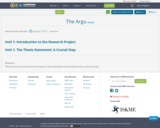
This resource is to introduce the writing of a thesis statement and introduction for a research essay.
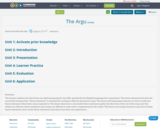
The learner-audience for this lesson are adults preparing for the GED, specifically the English/Language Arts assessment. The lesson demonstrates how the successful writing of the “thesis-statement” is essential for writing an effective persuasive essay. The lesson will help prepare learners to write an effective thesis statement which their essay responds to. The lesson shows how a successful thesis statement guides the direction of the rest of the essay and that without an effective thesis statement most essays are difficult to write and to comprehend for the reader. The lesson encourages learners to practice writing thesis statements and to write thesis statements that draw from their own experiences.
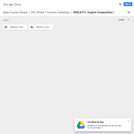
English 101 focuses on the analysis of basic human issues as presented in literature with an emphasis on analytic reading, writing and discussion, and on development of argumentative essays based on textual analysis, with attention to style, audience and documentation. By writing several analytical, thesis-driven essays which show engagement with and understanding of a variety of texts, students will practice the critical thinking, reading and writing skills which comprise an important component of college and university studies as well as clear, audience-appropriate communications in other professional settings.This class is comprised of a series of three units, each of which is centered around an essay assignment. For each unit, in addition to the essay itself, youŰŞll be asked to respond to reading assignments and to complete exploratory writing assignments. YouŰŞll do a lot of reading and writing, and your instructor will ask you to respond to ideas from our texts, from specific assignments, and from each other. Login: guest_oclPassword: ocl

The 11th grade learning experience consists of 7 mostly month-long units aligned to the Common Core State Standards, with available course material for teachers and students easily accessible online. Over the course of the year there is a steady progression in text complexity levels, sophistication of writing tasks, speaking and listening activities, and increased opportunities for independent and collaborative work. Rubrics and student models accompany many writing assignments.Throughout the 11th grade year, in addition to the Common Read texts that the whole class reads together, students each select an Independent Reading book and engage with peers in group Book Talks. Students move from learning the class rituals and routines and genre features of argument writing in Unit 11.1 to learning about narrative and informational genres in Unit 11.2: The American Short Story. Teacher resources provide additional materials to support each unit.

In this unit, students will explore great works of American literature and consider how writers reflect the time period in which they write. They will write two literary analysis papers and also work in groups to research and develop anthologies of excellent American stories.
ACCOMPLISHMENTS
Students read and analyze stories from several 19th-, 20th-, and 21st-century American authors. After researching a time period, they select stories from that period to create an anthology. The readings enhance their understanding of the short story, increase their exposure to well-known American authors, and allow them to examine the influence of social, cultural, and political context.
Students examine elements of short stories and have an opportunity for close reading of several American short stories. During these close readings, they examine the ways that short story writers attempt to explore the greater truths of the American experience through their literature.
GUIDING QUESTIONS
These questions are a guide to stimulate thinking, discussion, and writing on the themes and ideas in the unit. For complete and thoughtful answers and for meaningful discussions, students must use evidence based on careful reading of the texts.
If you were to write a short story about this decade, what issues might you focus on?
What defines a short story? Just length?
To what extent do these stories reflect the era or decade in which they were written?
To what extent are the themes they address universal?
CLASSROOM FILMS
History.com has short videos on the Vietnam War (“Vietnam” and “A Soldier's Story”).
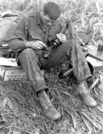
In the final lesson in this episode, and as a warm-up for the final essay and project, students will discuss the organization of the student sample essay “The Search for Knowledge.”

This class is one of the core requirements for the Environmental Masters of Engineering program. It is designed to teach about environmental engineering through the use of case studies, computer software tools, and seminars from industrial experts. Case studies provide the basis for group projects as well as individual theses. Past case studies have included the MMR Superfund site on Cape Cod; restoration of the Florida Everglades; dredging of Boston Harbor; local watershed trading programs; appropriate wastewater treatment technology for Brazil; point-of-use water treatment for Nepal, Brownfields Development in Providence, RI, and water resource planning for the island of Cyprus. This class spans the entire academic year: students must register for the Fall term, IAP, and the Spring term.

This class is one of the core requirements for the Environmental Masters of Engineering program, in conjunction with 1.133 Masters of Engineering Concepts of Engineering Practice. It is designed to teach about environmental engineering through the use of case studies, computer software tools, and seminars from industrial experts. Case studies provide the basis for group projects as well as individual theses. Recent 1.782 projects include the MMR Superfund site on Cape Cod, appropriate wastewater treatment technology for Brazil and Honduras, point-of-use water treatment and safe storage procedures for Nepal and Ghana, Brownfields Development in Providence, RI, and water resource planning for the island of Cyprus and refugee settlements in Thailand. This class spans the entire academic year; students must register for the Fall and Spring terms.
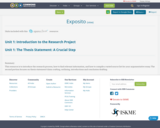
This resource is to introduce the research process, how to find relevant information, and how to compile a varied source list for your argumentative essay. The second portion focuses on thesis statement/claim crafting, outlining, introductions and conclusion drafting.

The purpose of this course is to develop your writing skills so that you can feel confident writing the essays, term papers, reports, and exams you will have to produce during your career here at MIT. We will read and analyze samples of expository writing, do some work on vocabulary development, and concentrate on developing your ability to write clear, accurate, sophisticated prose. We will also deal with the grammar and mechanical problems you may have trouble with.
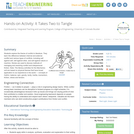
Students explore the theme of conflict in literature. They learn the difference between internal and external conflict and various types of conflicts, including self against self, self against other, and self against nature or machine. Stories are used to discuss methods of managing and resolving conflict and interpersonal friction. Note: The literacy activities for the Mechanics unit are based on physical themes that have broad application to our experience in the world â concepts of rhythm, balance, spin, gravity, levity, inertia, momentum, friction, stress and tension.
![Lenses of Vietnam: Protest in a Democracy [Inquiry Design Model (IDM) Unit Plan]](https://img.oercommons.org/160x134/oercommons/media/courseware/lesson/image/22Photograph_of_a_Female_Demonstrator_Offering_a_Flower_to_a_Military_Police_Officer22_by_Albert_R._Simpson_uOQkEc8.gif)
This inquiry takes students through an analysis and evaluation of the Compelling Question “Is protest important in a democracy?” using the Vietnam War as a lens to approach the topic. To accomplish this, students will become more media literate through evaluating sources, biases, perspectives, and the goals of creating media. Throughout the inquiry, students will engage in activities designed to promote and develop media literacy while analzying the Compelling Question and learning about the historical protests of the Vietnam Era.This inquiry is expected to take two weeks (10 periods) to complete: one 45-minute class period to stage the question, introduce the inquiry, and to review media literacy; two 45-minute class periods for each of the three supporting questions; and then three 45-minute class periods for students to write and research their argumentative thesis. If students are as of yet less familiar with media literacy, the instructor should add at least another class period, or more, introducing them more fully to this.The full unit, along with all materials and resources, is available as a PDF attachment.
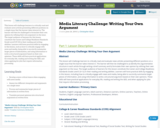
This lesson will challenge learners to critically read and evaluate news articles presenting different positions on a single issue that the learner takes interest in. The learner will then be challenged to formulate their own opinion by refining their own argument on the issue. The target audience of learners for this lesson constitute the Career and College Readiness Standards Grade Level E (9-12) in their reading and writing abilities. Learners will hone practical skills by engaging in this lesson, such as how to critically engage with news and media, being able to succinctly summarize larger pieces of information, and using information to write a structured argument based on their own opinions. These skills will have practical applications for everyday life, reading and writing the GED, and when applying for jobs that require information processing.
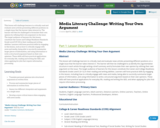
This lesson will challenge learners to critically read and evaluate news articles presenting different positions on a single issue that the learner takes interest in. The learner will then be challenged to formulate their own opinion by refining their own argument on the issue. The target audience of learners for this lesson constitute the Career and College Readiness Standards Grade Level E (9-12) in their reading and writing abilities. Learners will hone practical skills by engaging in this lesson, such as how to critically engage with news and media, being able to succinctly summarize larger pieces of information, and using information to write a structured argument based on their own opinions. These skills will have practical applications for everyday life, reading and writing the GED, and when applying for jobs that require information processing.
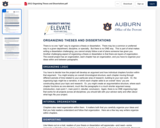
There is no one “right” way to organize a thesis or dissertation. There may be a common or preferred way in a given department, discipline, or specialty. But there is no ONE way. This is part of what makes writing a dissertation challenging; you cannot simply follow a set of plans someone has given you. Another challenging aspect of organizing a thesis or dissertation is that there are layers of organization. The overall project has an organization, each chapter has an organization, and you have to organize your ideas within and between paragraphs.
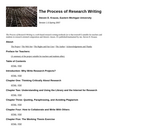
The Process of Research Writing is a web-based research writing textbook (or is that textweb?) suitable for teachers and students in research oriented composition and rhetoric classes.

This PowerPoint presentation can be used as a study guide or during class instruction to help students understand the process and connections between the thesis, introduction, and topic sentences of a traditional essay. If viewing for study, the student should follow along with the display mode.
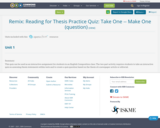
This quiz can be used as an interactive assignment for students in an English Composition class. The two-part activity requires students to take an interactive quiz on assessing thesis statements within texts and to create a quiz question based on the thesis of a newspaper article or editorial.
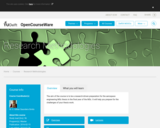
It is expected that Students who take part in this course have completed almost all courses of their MSc and are about to start on their Master Orientation project, their Literature Study or MSc thesis depending on their chosen MSC track.
It is of little value to take this course early, so please plan accordingly!
Course Contents The aim of the course is to be a research-driven preparation for the aerospace engineering MSc thesis in the final year of the MSc. It will help you prepare for the challenges of your thesis work.
The course will consist of 7 lectures and will be taught online using video lectures in periods 1, 2 and 3 and face-to-face using traditional lectures in period 4.
The lecture set up is as follows:
1. Research Design in MSc - Introduction to research, research framework
2. Research Methods - Stages of a project, Research objective, research questions, research strategy, research methods
3. Data Analysis - Quantitative & Qualitative methods
4. Validation & Verification - How to validate & verify your work?
5. Project Management & Peer review of draft Project plan - How to manage your project and your thesis progress. Project plan peer review
6. Planning - How to plan, expectations, Gannt Charts
7. Literature Review - How to carry out a scientific literature review? Differences between review and research
Please be advised that all lectures are also available via Blackboard for those following the online version. It is possible to do this course by distant learning, attendance in the 4th period, though highly appreciated, is not mandatory!
Study Goals At the end of the course the student will:
- be aware of the expectations of an MSc student
- be able to formulate a research question and research aim
- be able to set up a research plan for their MOP/Literature Study/MSc thesis
- be able to write a literature review based on the research plan with a view to select appropriate methodologies for their MOP/MSc thesis
Education Method (Online) Lectures, Assignments and voluntary Peer review of each others research plans and literature studies